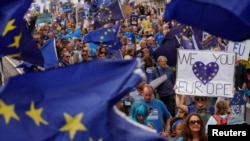With businesses fretting over political uncertainties, including the potential impact of Britain's exit from the European Union, economic growth in the 19-country eurozone has lost some momentum, a closely watched survey found Wednesday.
However, a survey of British businesses provided further evidence that they have put the initial shock of the Brexit vote behind them, thanks partly to the plunge in the pound. The drop in the currency, which this week hit to a 31-year low against the dollar, makes British exports more competitive.
What both the eurozone and Britain have in common is the outlook remains clouded by what happens next regarding Brexit.
British Prime Minister Theresa May confirmed over the weekend that she will invoke by March the so-called Article 50 of the EU treaty, the mechanism by which two years of talks on Britain's exit officially commence.
Beyond that, it's all very unclear, especially what Britain's trading relationship with the remaining 27 EU countries will be like.
For now, financial information company IHS Markit found that Brexit has been a drain on the eurozone, the group of EU countries that use the euro as their common currency. It has created uncertainty, which tends to hinder activity in an economy that's failed to gain much traction over a couple of years.
IHS Markit's purchasing managers' index for the eurozone, a broad gauge of economic activity encompassing the manufacturing and services sectors, edged down to a 20-month low of 52.6 points in September from 52.9 the previous month.
As anything above 50 indicates expansion, IHS Markit said its index indicates the economy continues to grow, but at a quarterly rate of only 0.3 percent, a muted pace that's unlikely to make much of a dent in the jobless count.
Of the eurozone's four largest states, IHS Market found that only France is showing signs of gaining momentum, with growth trending lower in Germany, Italy and Spain. Italy, it added, is possibly the biggest source of concern with third quarter growth of 0.1 percent, while Spain, in spite of a slowdown in September, remains the standout performer among the big four.
The slowing rate of growth across the region in part reflects "growing caution" among businesses about the economic outlook, often due to political uncertainty, said Chris Williamson, IHS Markit's chief economist.
"We see this trend persisting into next year, as the impact of Brexit is exacerbated by uncertainty surrounding elections in France and Germany alongside ongoing political unrest in Italy and Spain," he added.
In an equivalent survey in Britain, which it conducts with the Chartered Institute of Procurement and Supply, IHS Markit said its all-sector purchasing managers' index for the country rose to an eight-month high of 53.7 in September from 53.2 the previous month. In July, it had tanked in the wake of the Brexit vote to 47.3.
Though the prospect of an economic recession in Britain in the aftermath of the vote has "all but evaporated," Williamson sought to counter any suggestion that Brexit is not a live issue for the British economy.
He noted that British economic growth "remains far weaker" than earlier in the year, and that optimism about the year ahead continues to run at a "subdued" level — reflecting widespread concerns about Brexit.
Some companies worry that the British government will cut off their access to the EU's single market when the country leaves the EU. That would raise tariffs and barriers to trade to the EU, Britain's biggest export market.
"As such, the economy remains vulnerable to further setbacks and the need for policy action later in the year cannot be ruled out," he said.




